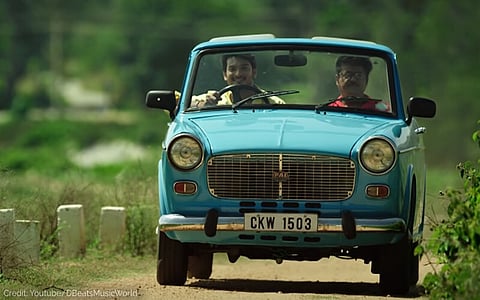
- Reviews
- Power List 2024
- Cannes 2024
- In-Depth Stories
- Web Stories
- News
- FC Lists
- Interviews
- Features
- FC SpecialsFC Specials

Language: Kannada
Cast: Jaggesh, Madhoo, Vivek Simha
Director: Ramesh Indira
Premier Padmini is a rare Kannada film that deals with relationships, of many kinds, in urban and rural settings. It opens with a somber song and introduces you to Vinayak (Jaggesh), a middle-aged man who's lost the last bit of interest to go to work. His grouse, which he doesn't put into words, is that he's single. His wife, Sruthi (Madhoo), has applied for a divorce. She's also in love with another man, and that's one of the reasons for his general lack of enthusiasm.
While Spandana (Sudha Rani), his neighbour, showers affection on him by making breakfast, another old man, who lives next door, can't seem to hold his thoughts to himself. The grandpa (played by Dattanna, with a Peeping Tom's face) suspects that there's something going on between the two of them. These are the kinds of characters that you'll find in your apartment building, and writer-director Ramesh Indira has made sure that there's no dearth of humour and hubris during their daily interactions.
This isn't a film that's going to make fun of divorced men, or remarriages. Indira just populates the world of Premier Padmini with a lot of disappointed and unhappy people. If Vinayak finds no zeal to do anything in life, his estranged son, Sumukh (Vivek Simha), is equally untouched by the hand of responsibilities and swims in apathy—and tears—for he feels neglected by his parents. When was the last time you saw a son push his mother and walk away without getting punished for it?
Sumukh tells everybody that his parents are dead. Likewise, his friend, Ranjini (Hitha Chandrashekar), is of the opinion that her step-mom is trying to grab her mother's place. With so many sad tales, Indira could have turned Premier Padmini into a tear-jerker. But he didn't, and I thank him for that. There's also another important character in the mix – Nanjundi (Pramod), the driver. I quite liked how Vinayak and Nanjundi become friends and borrow from each other's strengths and silences.
Nanjundi is a trustworthy fellow who keeps asking questions. He's a small-town boy in a big-chested city; however, he's not a fish out of water as he knows how to make lemonades when life throws lemons at him. The experiences he's had definitely deserve another movie, but, for now, I'm glad that he's not used as a mere tool to educate Vinayak on how to lead a positive life.
More than the larger arcs, I consumed the sub-stories better since they were written and narrated fantastically—be it the arrogant boss who slaps his driver and deserts him in the middle of the road, or the father who rapes his own daughter and doesn't regret it as he thinks she owes her life to him. You may read these disturbing accounts in newspapers today and forget them tomorrow, but, when you see them come alive on the big screen, your heart will struggle to keep its calm.
Within an hour and fifty minutes, Premier Padmini manages to raise a point about inter-caste relationships too. Sruthi raises her voice against her mother-in-law in the hospital (the latter has been admitted for a problem in the hip) and tells her that she hasn't forgotten the way she was treated for belonging to a different caste. The dialogues don't specify their castes, but some lines hint at Vinayak's Brahminical status. If this movie were made three-four decades ago, the feelings of alienation and hurt would have been spelled out in clearer terms. But, now, we'll have to make do with symbols and cryptic messages.
Even though the conversations in the film flow smoothly, many a time the characters begin to resemble one another due to their penchant for making a philosophical mountain out of an absent molehill – example: "Bad memories are like corpses, they need to be burned." I'm also adding Ranjini's angry response to her father for doubting her intentions in this list – "Good luck with your life and your wife." That line is just as stupid as, "If you're bad, I'm your dad." All the characters cannot behave in the same manner, and filmmakers need to understand this.
Nevertheless, Premier Padmini is still miles ahead of the numerous Yajamanas and Padde Hulis of Kannada cinema. Ten years from now, if somebody makes a listicle on fragmented relationships, this movie will rank in the top-ten.